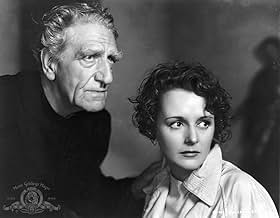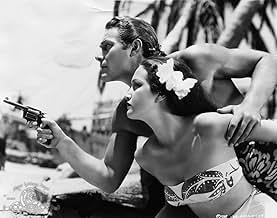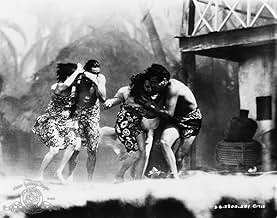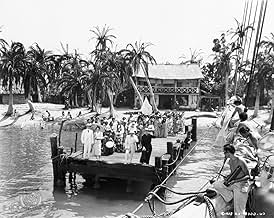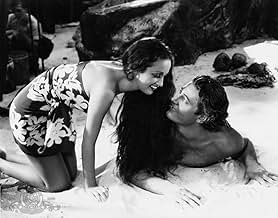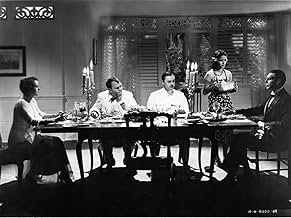Füge eine Handlung in deiner Sprache hinzuA Polynesian sailor unjustly imprisoned after defending himself against a colonial bully is relentlessly persecuted by his island's martinet French governor.A Polynesian sailor unjustly imprisoned after defending himself against a colonial bully is relentlessly persecuted by his island's martinet French governor.A Polynesian sailor unjustly imprisoned after defending himself against a colonial bully is relentlessly persecuted by his island's martinet French governor.
- 1 Oscar gewonnen
- 3 Gewinne & 2 Nominierungen insgesamt
- The Governor
- (Nicht genannt)
- Native
- (Nicht genannt)
- Judge
- (Nicht genannt)
- Reri
- (Nicht genannt)
Empfohlene Bewertungen
I grew up with THE HURRICANE, which was a staple of TV viewing throughout the '60s and '70s. But seeing it now for the first time in years I am struck by how subversive of convention it must have seemed in the '30s, and how much it was in sync with the cultural and political wars of the late '60s. Terangi, the kind, capable natural man wants merely to live freely and happily, but he is imprisoned and tortured and unwittingly finds himself in opposition to a rule of law that is anti-love, anti-life, anti-human. Every frame of this film sides with Dorothy Lamour and Jon Hall, the gorgeous young lovers, against the hard fanaticism of Massey's governor. Meanwhile the priest, the doctor, the sea captain and the governor's own wife are sensible, kind-hearted (if condescending) humanists who are on the correct side of the debate, but who are helpless in the face of insane obedience to authority.
Yes, the hurricane is marvelously done, impressive and absorbing, and it acts as a very necessary catharsis after the anxiety aroused by the many injustices Terangi must endure. But what seems to matter most to Ford is the idyll of sexy young love, not seen in films since the first two pre-code TARZAN pictures from MGM. Once married, the couple are stripped of their western clothes by their friends and returned to their near-naked state wearing sarongs and flower leis. It is Lamour's character who signals to her husband that she is ready for the honeymoon to begin, and the camera follows the happy couple to their private island where they lay in the sand to make love under palm trees. Just as sensual is the morning after, where Lamour raises the shades of their hut, letting the sun fall on her husband's naked back, and her hair falls around him as she leans down to kiss him tenderly on the neck. This must have been a powerful vision of romance and eroticism to workaday, Depression-weary audiences. The island scenes cast a naive spell, like something from Melville's early books of south sea island life. Ford films these like silent screen montages, with dissolving images of swaying palms, bare, tanned legs, the look of young, tawny bodies and shining hair. Rather than just a professional job for him, his work on THE HURRICANE seems deeply felt.
Lamour was just right here: Though not yet the wry comic actress she would become, she was rather gravely beautiful in a way unusual for an American star then and now, full of languor and sometimes a startling natural grace. The way Marama suddenly pulls her hair back from her face when first seeing Terangi after eight years is an expressive gesture, full of emotion. Hall was very appealing, with the grace of an athlete and for all his muscularity there is something feline about him. And for those aware of rumors that director Ford may have nursed closeted yearnings all his life (as revealed by Maureen O'Hara in her autobiography of 2005) the fevered way that Hall's body and face are photographed in the midst of his torments will have an added charge and interest.
There are several fine performances. My favorite is that of Raymond Massey as he is very convincing in the thankless role of a cold-hearted governer who towards the end shows a sadistic side and then, at the very end of the movie, shows that there is good in everybody.
Then there is the hurricane itself. Naturally I have not seen every movie ever made, but seeing how this movie predates the computer age the hurricane is surely the greatest special effects in movie history.
For sheer entertainment I give it 9 out of ten.
Wusstest du schon
- WissenswertesAccording to Life Magazine, special effects wizard James Basevi was given a budget of $400,000 to create his effects. He spent $150,000 to build a native village with a lagoon 200 yards long, and then spent $250,000 destroying it.
- PatzerAs the the hurricane bears down on the church with its flooding fury, some of the native islanders choose to escape the failing structure by making their way out clinging to a tied off rope. As one of the huge waves hits the rope, a couple of the women islanders get flipped over and appear to be drowning. During the flip, one of the women's sarong top gets pulled down from the special effects wave and for a split second there is a bare breast exposure which the censors didn't catch.
- Zitate
DeLaage: You helped Terangi? My own priest?
Father Paul: I'm his priest too!
DeLaage: You helped a murderer!
Father Paul: I aided a man whose heart is innocent.
DeLaage: You've given aid to anarchy and bloodshed!
Father Paul: I'll answer for it.
- VerbindungenFeatured in Movies Are Adventure (1948)
Top-Auswahl
- How long is The Hurricane?Powered by Alexa
Details
Box Office
- Budget
- 2.000.000 $ (geschätzt)
- Laufzeit1 Stunde 40 Minuten
- Farbe
- Seitenverhältnis
- 1.37 : 1
Zu dieser Seite beitragen




